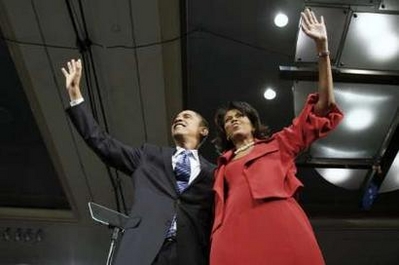Obama leads Clinton by only 2 delegates
Updated: 2008-02-09 09:40
WASHINGTON - Three days after the voting ended, the race for Democratic delegates in Super Tuesday's contests was still too close to call. With nearly 1,600 delegates from Tuesday contests awarded, Sen. Barack Obama led by two delegates Friday night, with 91 delegates still to be awarded. Obama won 796 delegates in Tuesday's contests, to 794 for Sen. Hillary Rodham Clinton, according to an analysis of voting results by The Associated Press.
 US Democratic presidential candidate Senator Barack Obama (D-IL) and his wife Michelle (R) acknowledge the crowd at his "Super Tuesday" primary election night rally in Chicago, Illinois, February 5, 2008. Twenty-four of the 50 states are holding nominating contests for one or both parties on "Super Tuesday" for a huge haul of delegates to this summer's conventions that will choose the candidates for the November presidential election. [Agencies] |
In the Republican contest, Sen. John McCain had a commanding lead in the race for delegates.
Nearly a third of the outstanding delegates are from Colorado, a state where Obama won the popular vote. California, a state that Clinton carried, had 20 Democratic delegates still to be awarded. Neither state expected to have complete results before next week.
Obama won the popular vote in 13 states Tuesday, while Clinton won in eight states and American Samoa.
In the overall race for the nomination, Clinton has 1,055 delegates, including separately chosen party and elected officials known as superdelegates. Obama has 998.
A total of 2,025 delegates are need to secure the Democratic nomination.
Many delegates were outstanding because some states have been unable to provide all the votes in some congressional districts. The problems arose in states with counties that are split into multiple congressional districts.
The states have provided results in each county. But in some cases, they are still working to assign the votes in the appropriate congressional district.
Those votes are important because both parties award delegates based on statewide votes and on results in individual congressional districts. Democrats award them proportionally, meaning precise counts can be necessary, even when the vote is overwhelmingly in favor of one candidate.
In California, officials were still counting absentee ballots Friday. Officials had estimated that more than 1 million absentee ballots may have been submitted.
In Tuesday's Republican contests, McCain won 617 delegates to 205 for former Massachusetts Gov. Mitt Romney, who suspended his campaign on Thursday. Former Arkansas Gov. Mike Huckabee won 155 and Rep. Ron Paul won 10. There are still 36 Republican delegates to be awarded from Tuesday's contests.
In the overall race for the nomination, McCain leads with 719, to 198 for Huckabee and 14 for Paul. Romney's suspended campaign still has 298 delegates.
A total of 1,191 delegates are needed to secure the Republican nomination.
The AP tracks the delegate races by projecting the number of national convention delegates won by candidates in each presidential primary or caucus, based on state and national party rules, and by interviewing unpledged delegates to obtain their preferences.
In some states, like Iowa and Nevada, local precinct caucuses are the first stage in the allocation process. The AP uses preferences expressed in those caucuses to project the number of national convention delegates each candidate will have when they are chosen at county, congressional district or state conventions.
|
|
|
||
|
||
|
|
|
|